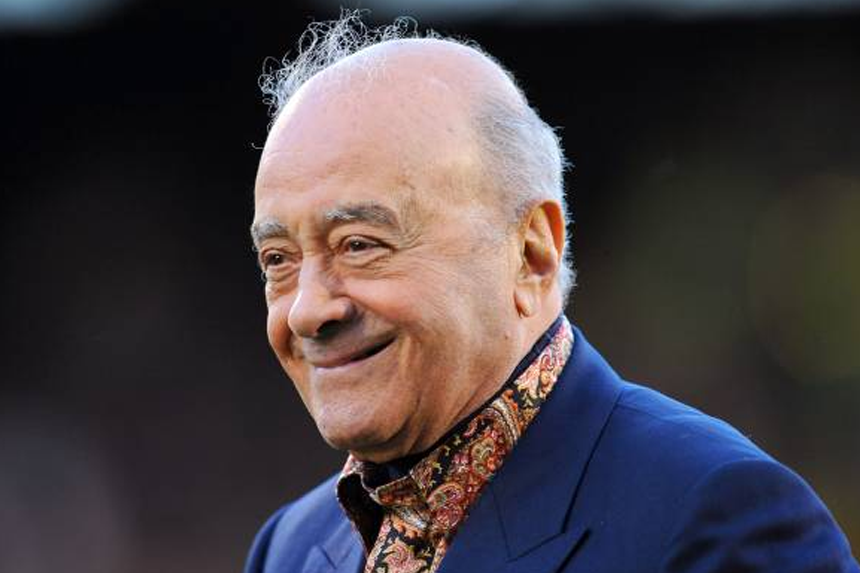Following two complaints sent to the Independent Office for Police Conduct (IOPC), the Metropolitan Police is under investigation for its treatment of sexual offence claims made against former Harrods owner Mohamed Al Fayed. Under the direction of the IOPC, these allegations about how the police handled reports of sexual misconduct before Al Fayed died in 2023 will now be investigated. Concerns about how the issue was handled in the past are driving great interest in the police investigation of these allegations.
The inquiry forms part of a larger evaluation of twenty-one claims made by women before Al Fayed’s death. Two of these cases—raised in 2008—are the focus of the current inquiry. The IOPC verified that although under the supervision of the independent agency, the police’s Directorate of Professional Standards (DPS) will conduct the investigation. For the police inquiry, this is a pivotal point since it may result in wider responsibility.
What Claims Regarding Al Fayed Have Surface?
Regarding the suspicions of sexual offences against Al Fayed, further developments have surfaced, exposing a sequence of allegations of sexual misbehaviour. These claims comprised trafficking, sexual assault, and rape.
The Metropolitan Police had already spoken with twenty-one women accusing Al Fayed of sexual offences before these allegations went public. Despite these grave claims, the previous Harrods owner was never prosecuted for crimes. Only as more discoveries surfaced did the police reveal these findings to the public.
A further 90 women have contacted the Metropolitan Police since these fresh discoveries; their complaints date back to 1977. This has spurred further research on the acts of the former Harrods manager and the part of individuals who might have helped or allowed his crimes to be played. The scale of the police investigation into Al Fayed’s conduct continues to grow.
What Are the Complaints Regarding the Police’s Response and Public Disclosure?
Among the women who had previously reported allegations against Al Fayed, two have come forward with complaints about how the police handled their cases. These accusations were initially filed in 2008, but after subsequent discoveries, the ladies voiced concerns about the quality of the police response and how the facts of their charges were made public.
The Metropolitan Police stated that the complaints are centred on “concerns about the quality of police response and how details came to be disclosed publicly.”
Why is the IOPC Investigating the Handling of These Allegations?
Steve Noonan, the IOPC’s head of operations, addressed the public outcry over the case. “There is widespread public concern around this case, with a significant number of allegations reported over many years Mr. Al Fayed was still alive,” he stated. “It’s vital that an inquiry is conducted into these complaints to identify if officers failed to properly investigate these reports made back in 2008 or if there were any missed opportunities.”
Noonan’s remarks underscore the need to attend to the issues brought out by the complainants. The IOPC’s participation seeks to ascertain whether any chances to look at Al Fayed’s actions were lost and whether the police neglected to handle the allegations at the time appropriately. Transparency and responsibility depend on continuing police investigations.
How might the probe of these complaints develop?
The IOPC will supervise investigations into the two particular claims in line with the larger inquiry of the 21 allegations. This could result in a more extensive investigation, depending on the examination results. The watchdog said: “The IOPC is directing the investigations as the Met’s ongoing review of the 21 allegations means it could become much wider than the two complaints.”
Emphasizing the need for openness and responsibility in this delicate issue, the IOPC reassured the complainants that they would be routinely informed throughout the inquiry. Further disclosures could surface as the cops probe.
What New Investigation on Abuse Enablers Is the Metropolitan Police Conducting?
Apart from the complaints investigation, the Metropolitan Police started another probe in late November, specifically looking at anyone who might have helped or enabled Al Fayed’s claimed sexual assaults. The current investigation seeks to identify the possible roles different people could have had in either supporting or encouraging Al Fayed’s abuse.
The force is also looking at what chances these people had to shield any victims from his predatory activities. The inquiry will examine if any people helped to let these crimes go unpackled for many years. To fully understand the circumstances, this part of the police inquiry is essential.
What more general consequences result from continuous research?
Public interest in the issue is still strong, given the scope of the accusations and continuous inquiry. Both in terms of the complaints about their handling of the matter and the more general inquiry into Al Fayed’s claimed abuse, the police are under more and more pressure to guarantee comprehensive and impartial investigations are conducted.
It is evident from the investigations that the case will have long-lasting effects on the Metropolitan Police and the general confidence in law enforcement to manage claims of this kind with suitable seriousness and attention. For justice and responsibility in this well-publicized case, the continuous police inquiry marks a turning point.








